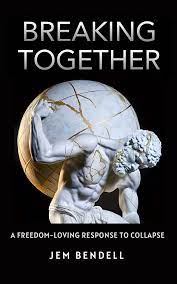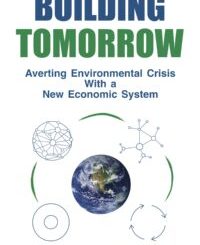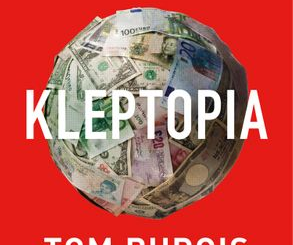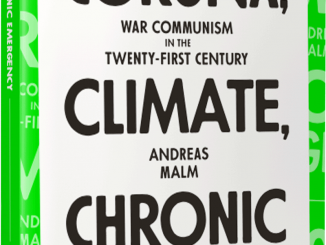
Book Review by Andrew Medhurst
“This book provides…the basis for freeing ourselves from old compromises, and exploring what we might do with the rest of our lives.” Jem Bendell
It’s no exaggeration to claim that Jem Bendell changed my life.
The British academic acting as Morpheus (from The Matrix movie), fed me the ‘red pill’ in the form of his 2018 paper, “Deep Adaptation: A Map for Navigating Climate Tragedy”. The possible (probable?) future he described was one many simply could not ignore. The paper went viral, influencing thousands to reassess their work and life, including myself. I resigned from my 30-year banking career that had seen me live in Hong Kong, Tokyo and Bangkok to volunteer for Extinction Rebellion (‘XR’), eventually leading their financial team until 2021.
In his new book, ‘Breaking Together – a freedom-loving response to collapse’, Bendell reveals himself as not so much a prophet of doom but as a professor of collapse. He offers us an integration of multiple fields of science to demonstrate that modern societies began to break down before the pandemic. When sending me a review copy of the book, he wrote: “I’m not predicting or prophesying anything, but chronicling what has already begun, then suggesting why and what to do about it.” In this review I try to summarise the main themes of the book, including chapters which caught my eye and are most relevant.
Introduction
Usefully, Bendell summarises the entire book in a lengthy introduction including the “aggressive, tactical and coordinated” criticisms of the collapse-anticipation conclusions in his original paper. He also admits that he was wrong to conclude in 2018 that societal collapse was inevitable – research for this book, which he presents, indicates it had already begun “sometime before 2016”.
For a long time I had assumed, like the author, collapse was a specific future event, but Bendell explains how the study of ancient and recent history indicates “collapse of a society is typically a process, not an event”. The evidence for the “uneven ending” of some of the most basic needs of people in industrial consumer societies (e.g., sustenance, shelter, health and security) is provided in the first half of the book. Each of the first six chapters considers a specific aspect of collapse – economic, the biosphere, food and societal (culture) with the seventh chapter summarising how they combine to show the “inevitable breakdown of modern societies.”
Chapter 2: “Monetary collapse – it was made inevitable”
As someone who has benefited from a career in investment banking, I’m aware my interest in what Bendell describes as the “soon-to-be-collapsed monetary system” contains an element of self-interest(!) but in this chapter, Bendell shows me my ignorance of the monetary system and its inherent flaws. As an expert in digital currencies who has engaged with the topic since 2006, the author acknowledges how “impenetrable and boring” the subject is for most people, but argues that a chapter on this subject is necessary if we are to truly understand the mechanics of power, and how and why what he refers to as ‘money-power’ has made a God out of economic growth.
I agree – activism without an understanding of how private banks control our debt-based system risks activists demanding solutions that lack credibility. Demanding decarbonisation of economies (which we must) is unlikely to be accepted by policy makers if, under the current system, as Bendell says “politicians have no choice but to try to grow GDP if they are to avoid their country entering recession and facing economic ruin.”
The most controversial part, perhaps, of this chapter is Bendell’s suggestion that central banks’ buying of corporate bonds, which started in 2016 but switched into hyperdrive at the start of the pandemic, is a form of disaster capitalism. Money elites, anticipating the demise of existing currency systems, have embarked on a “neocolonial dash for corporate and digital territory around the world” while the dollar, Euro and pound still have some value. These actions, rather than post pandemic supply chain issues or the Russian invasion of Ukraine, have caused the cost-of-living crisis that is impoverishing populations – Bendell argues “reclaiming our monetary powers” needs to be at the centre of our political agenda and activism in future.
Chapter 3: “Energy collapse – and problems with NetZero”
Bendell’s writing style and his ability to communicate complex issues in digestible form is nowhere more on display than in the chapter on energy. Did you know “a barrel of oil yields the equivalent energy of about 24,000 hours of human labour”, or that “global fossil fuel use is equivalent to at least 800 billion humans working for 8 hours every day” – yeah, neither did I!
So, humans globally benefit from, on average, “100 energy slaves”. Or 300 if you are an American! And decarbonising economies means giving most of those up. Gulp!
Consumer industrial societies’ energy dependence “is a far more inconvenient truth than most environmentalists wish to acknowledge” says Bendell and he eloquently demolishes the idea that either renewable energy (not sufficient key minerals, and still a high dependence on fossil fuels) or a massive expansion of nuclear power might be the solution. Those who insist on NetZero need to consider that removing fossil fuels swiftly would have terrible consequences for the basic needs of people in consumer industrial societies. A clumsy and unjust implementation of such policies could lead to political reactions that hasten any collapse.
Chapter 5 – “Climate collapse – cascading failures”
I have spent the last five years consuming increasingly dire climate science. One of my first roles with XR was to deliver their ‘Heading for Extinction’ talk and, occasionally, I engage with global heating deniers on Twitter, so I did not expect to read anything new in the chapter on the Climate. But Bendell’s skill is how he explains the complexity of many factors impacting climate that is so often lost in numerous scientific papers specialising in one aspect. This interdisciplinary approach ruffles the feathers of some climate scientists who say he lacks scientific rigour. But Bendell goes on the offensive, explaining how scientists may have made mistakes in their own presentation of the data, in their “enthusiasm to give the public and policy makers a simple message” and have “opened the door for scepticism”.
Specifically, for example, he cites how data used in an IPCC report downplayed the significance of the Mediaeval Warm Period and criticises the presentation and focus of carbon gases as a “planetary thermostat that can be turned up or down by humanity” as a dangerous simplification. Perhaps for the first time, I am helped by this chapter to understand that “prior to human activity affecting the atmosphere, carbon dioxide nearly always increased hundreds of years after global average temperatures increased.” In debating ‘deniers’, how I wish I’d had much earlier the analogy the author provides in this chapter about how this time is different to previous warmings; that carbon gases are “tinder” which we have surrounded ourselves with as we sit in front of an open fire in our living room – one strong spit from the fire (i.e. “solar activity, with increased sunspots, an El Niño ocean current, or a lack of clouds due to deforestation”) could set the living room alight. “We might get lucky and have a period when the fire doesn’t spit that much, giving us time to remove the excess tinder from the living room”, he says.
The book’s second half
Having established from empirical evidence that consumer industrial societies are already collapsing, the author uses the second half of the book to articulate what is still worth fighting for, specifically freedom.
The final six chapters begin with a discussion of critical wisdom (the “elusive capability for understanding oneself in the world that combines insight from mindfulness, critical literacy, rationality and intuition”), particularly critical literacy which Bendell argues is so “crucial, absent, misrepresented and under attack”. How are we to be and to act if we do not have the “freedom to know”?
Bendell uses a boxing metaphor to describe how so many of us feel dazed and confused by the news and how, despite resisting with the typical psychological responses of fight, flight, freeze or fawn, perhaps it may be best (as he himself has experienced) to fall to the metaphorical floor in order to “take a moment to breathe and recover”.
Subsequent chapters offer suggestions for how collapse-aware travellers might live meaningful and helpful lives in this era of collapse. The reader is presented with credible arguments that humanity is not in the dock (“freedom from progress”) and how monetary systems are to blame for manipulating, forcing or rewarding us for killing the natural world (we need “freedom from banking”). Might now be a good time to find out “what unmanipulated and uncoerced humans might do about our planetary predicament?” Bendell asks.
At this point in the book, Bendell introduces a foundation for ‘ecolibertarianism’ – a “post-progress, progressive politics” which, despite sounding like an oxymoron, refers to “the importance of upholding the universal values of freedom and fairness as the existing systems of modern societies break down” (“freedom in nature”). In doing so, he contrasts how this would differ from the libertarianism associated with a particular type of right-wing politics.
So, what might this all mean for the reader? Clearly, a book providing evidence that societal collapse has commenced is not going to provide solutions for halting such a collapse but, in its place, we hear of the “freedom to collapse and grow”, specifically, the personal responses of two women and an argument for confidently claiming the identity of ‘doomster’ (which acknowledges an “ongoing passion…for being useful in society”).
If you will forgive me for extending the author’s use of the boxing metaphor, in the final chapter the gloves come off as Bendell looks at the growing need to respond politically, “as an ecolibertarian movement of resistance to elite panic and authoritarianism.”
Since 2018, I have watched attacks on Bendell’s scholarship and character, often from those with far bigger platforms. Is this simply ‘worldview defence’ from those who resist falling to that metaphorical floor or ‘doomer bashing’ triggered by deep fears of death and insignificance? Despite how tiring and emotionally upsetting that may be, I have also seen how the author has responded, in the most part putting into practice the kinder and wiser behaviours he calls for from others. If the gloves are off in the final chapter, it’s only because for those like Bendell who “want to contribute to reducing harm, or to live free without harming others (or both)” then there must be a description of the ways that “institutions of incumbent power and their apologists and officers are already making things worse in these early phases of societal collapse”.
Conclusion
This book is an important contribution to the public debate of how we should respond once we accept that it is no longer possible to ‘solve’ the predicament we face – that to remain positive and offer false hope, however well intended, will do more harm than accepting our starting point. It is an academic contribution that merits comparison with David Wallace Wells’ ‘An Uninhabitable Earth’ and I hope it has a similar impact.
It is a rallying call to rescue environmentalism from the authoritarian elites and the backlash they are generating and asks us to be explicit about our values as we live into this new era of collapse. It argues that we need an explicitly political (and policy) dimension to the collapse-aware communities/networks.
In the last few years, my regular pondering of the analyses of Bendell and other ‘collapsologists’ has given me a new basis for living the rest of my life. I want to help more of us to break together, not apart. It is probably the best chance my children have as they face a turbulent future.
Breaking Together – a freedom-loving response to collapse
Publisher: Good Works (E-Book)
ASIN: B0C1JLL45V




‘collapse and grow’ resonates loudly with me. Well written review for a book I’m very much looking forward to reading.